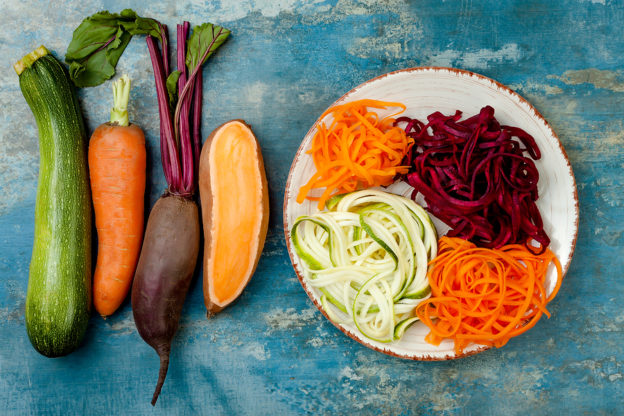By David Blyweiss, M.D., Advanced Natural Wellness
January 7, 2019
In the January 2nd issue of Advanced Natural Wellness we took the first step in addressing the age old diet question: Is a low-fat or low-carb diet the best for weight-loss and health?
And the answer is pretty simple.
When you eat the right kind of fats and carbohydrates, you don’t need to cut either of them from your diet.
And believe me! Cutting out fats and replacing them with the wrong kind of carbs can be deadly.
For example pasta, rice, bread and other refined grains and carbohydrates are staples here in the U.S. And almost anything you buy in a package is loaded with sugar. These types of foods get broken down very quickly and cause spikes in blood sugar. In response to this, your pancreas produces a large amount of insulin.
MD Exposes the Hidden Danger to Your Eyes

When your eyesight starts to fail, it's a real problem. Suddenly you can't go to the grocery store... you can't get to the doctor if you have an emergency... you can't meet your friends for dinner…
Your "regular" doctor doesn't have time to keep up with the latest research. And the same goes for eye doctors. They go to school to learn how to fit you for glasses and contacts, but have no way of preventing the damage and loss of eyesight that threatens your freedom and independence.
Let me show you something that explains a LOT about how your eyes work.
In my FREE Special Report, I'll show you a HUGE, untapped resource for your eyes that safely and naturally restores clear, effortless eyesight.
Click here to get started...
The more of these sugar-spiking carbs you eat, the more insulin your pancreas pumps out. But over time your cells become resistant to glucose-lowering insulin.
As a result, belly fat both in front of and beneath your abdominal muscles begins accumulating as your blood sugar levels creep up into diabetic ranges.
And you know as well as I do that diabetes and obesity come with a long list of complications including increased chances of heart disease, kidney damage, dementia, nerve problems and vision loss.
But that doesn’t mean there aren’t plenty of healthy carbs that take longer for your body to break down and digest… ones that support weight loss, great health and increased brain function.
Beans and lentils are considered “slow-carbs”. They’re absorbed slowly by your body, likely due to their high fiber content. This slow absorption helps prevent glucose and insulin spikes.
I find that beans are very filling. So you might be inclined to snack less throughout the day and eat smaller meals. (This might be why regular bean-eaters tend to have lower body weight and a smaller waist size. They’re also less likely to gain weight or become obese.)
I also find that people who eat the most beans have much lower levels of inflammatory markers associated with heart attack, cancer and dementia. In particular, their C-reactive protein (CRP) and interleukin-6 (IL-6) levels are about 40% lower than their non-bean-eating counterparts.
The World's Quickest Solution for Ending Prostate and Urinary Misery
This has recently been revealed to be one of the only real breakthroughs in prostate health.
The seeds of a strange fruit (sometimes called "Chinese Apples") hold powerful phytonutrients that are a revolution in prostate health.
In fact, UCLA and Veterans Administration research have now proved this to be true.
Not only that, but it may be the worlds quickest solution for ending prostate misery.
Simply stated, these phytonutrients represent a huge step beyond beta sitosterol, saw palmetto, and other phytosterols alone.
Simply click HERE if you want to have fast prostate relief...restful, uninterrupted sleep...no more constant "urges to go"...enhanced virility...and optimal prostate support for life.
Nutrient-dense organic produce is another great source for your daily carbohydrate intake.
Squash, peas, carrots, sweet potatoes and many other vegetables are perfect examples of healthy carbs. This is especially true when you use them without peeling or de-seeding them.
The same goes for fruits like apples, berries, pears, mango and other fruits. When you keep them intact, the skin provides fiber that’s necessary to slow down the release of sugar into your bloodstream.
To top it off, fruits and veggies have more health benefits than you can shake a stick at.
- Your risk of developing heart disease decreases by about 4% for each additional portion of fruit or vegetables you eat each day. In fact, eating an extra 21 ounces of these plant-based foods daily could slash your risk of coronary heart disease by about a third, and stroke by about 19%.
- Higher fruit and vegetable intakes are associated with improved blood glucose levels and a lower risk of developing type-2 diabetes.
- Eating three or more servings of fruits and vegetables a day can cut the risk the risk of developing age-related macular degeneration by more than a third.
- Three to nine servings of fruits and vegetables daily decreases calcium loss, a much-needed mineral that helps maintain strong, healthy bones and prevent fractures as you age.
- It’s estimated that higher fruit and vegetable intake cuts your chances of developing cancer by almost 20%.
- People who eat the most fruits and veggies can cut their risk of mental decline and dementia by about a quarter.
Dr. Walter Willett, Professor of Epidemiology and Nutrition at the Harvard School of Public Health and the chair of its department of nutrition from 1991 to 2017 and who I’ve had the opportunity to lecture with at a clinical nutrition conference once said:
“Fat is not the problem. If Americans could eliminate sugary beverages, potatoes, white bread, pasta, white rice and sugary snacks, we would wipe out almost all the problems we have with weight and diabetes and other metabolic diseases.”
So the question isn’t whether you should cut carbs – or even fats – from your diet.
It’s whether or not you’re choosing to eat the high quality fats and carbohydrates that fuel your body with health, vitality and energy.
SOURCES:
Jenkins DJ, et al. Effect of legumes as part of a low glycemic index diet on glycemic control and cardiovascular risk factors in type 2 diabetes mellitus: a randomized controlled trial. Arch Intern Med. 2012 Nov 26;172(21):1653-60.
Papanikolaou Y, et al. Bean consumption is associated with greater nutrient intake, reduced systolic blood pressure, lower body weight, and a smaller waist circumference in adults: results from the National Health and Nutrition Examination Survey 1999-2002. J Am Coll Nutr. 2008 Oct;27(5):569-76.
Esmaillzadeh A, et al. Legume consumption is inversely associated with serum concentrations of adhesion molecules and inflammatory biomarkers among Iranian women. J Nutr. 2012 Feb;142(2):334-9.
Hermsdorff HH, et al. Fruit and vegetable consumption and proinflammatory gene expression from peripheral blood mononuclear cells in young adults: a translational study. Nutr Metab (Lond). 2010; 7: 42.
O. Oguntibeju, E. J. Truter and A. J. Esterhuyse. The Role of Fruit and Vegetable Consumption in Human Health and Disease Prevention, Diabetes Mellitus – Insights and Perspectives, Prof. Oluwafemi Oguntibeju (Ed.), InTech. 2013.
Wu L, et al. Intake of Fruit and Vegetables and the Incident Risk of Cognitive Disorders: A Systematic Review and Meta-Analysis of Cohort Studies. J Nutr Health Aging. 2017;21(10):1284-1290.







